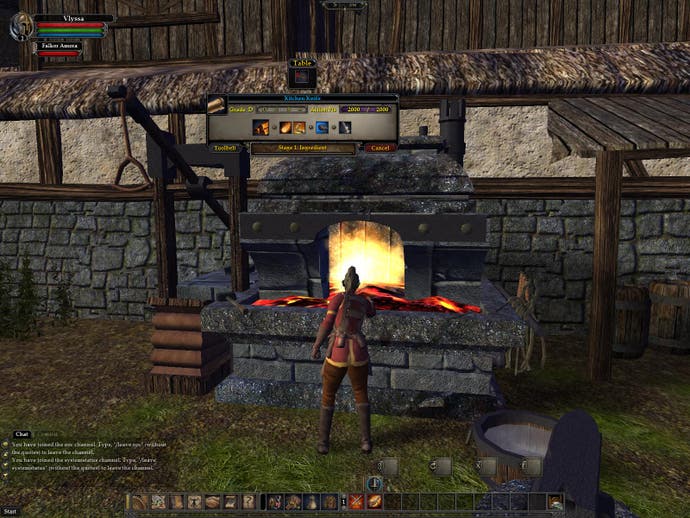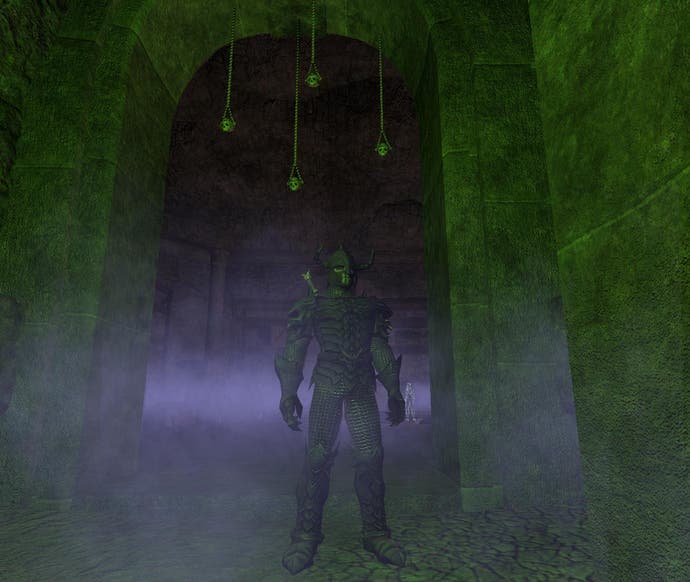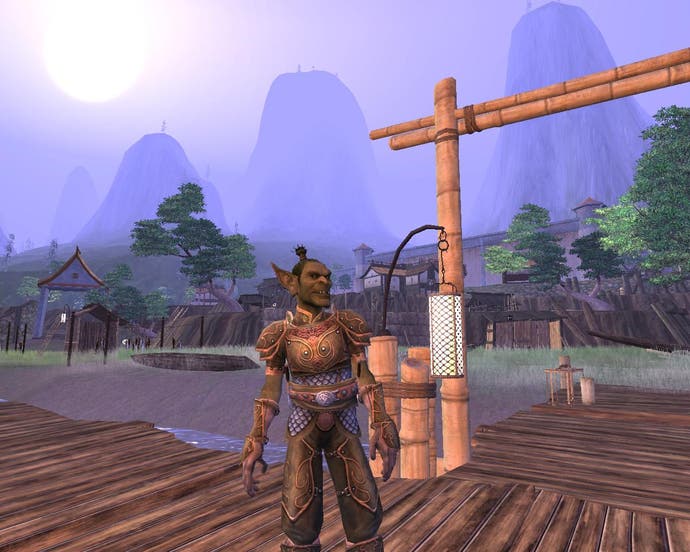Vanguard: Saga of Heroes
Will it make you say wow?
Burning Ambition
Vanguard's list of "headline" features doesn't stop there. You can buy property in the game, build a house on it and furnish it - and as a result, crafting is an enormous part of the game, with the team boasting that there will be 40,000 items to craft, ranging from the usual armour and weapons to things like furniture for houses. However, the crafting system seems to be in a state of flux at present; an earlier system which was very involved and quite unlike anything in any previous MMOG has been toned down seriously, which has some of the long-term beta testers in open revolt. Whether this toning down is a step that makes things more accessible to the average player, or a genuine dumbing down of a previously interesting system, is something that won't really be clear until the dust settles on the whole issue - for now, though, the prospect of a more dynamic and player-driven economy where crafting is a genuine core talent and a fun aspect of the game, rather than just being a sideshow attraction as it is in WoW and most other MMOGs, is a promising one.
Properties can also be turned into businesses, and it's possible to create a shop, set opening hours and so on, and essentially become a trader in the game - another different way to play which Vanguard hopes to offer to players for whom the quest 'n grind approach has grown weary. Like houses, boats, too, can be crafted and purchased - ranging from little one-man skiffs up to enormous Guild-owned vessels. The immediate question on everyone's lips when they see those ships is whether they'll get to play at being pirates; yes, Sigil assures us, naval combat and boarding of other ships will happen, but not until after the launch of the game.
Perhaps the most interesting - and the most difficult to implement, and hence likely to fail - of all of Sigil's ambitious plans for Vanguard is the diplomacy system. Like crafting, this is essentially a progression system which is entirely independent of normal quests and combat; it's got its own NPC quests and its own entirely unique "battle system", which is essentially a card game linked with a set of conversation options which allow you to persuade NPCs to do what you want them to, to look more favourably upon you, and so on. The idea is that by advancing as a diplomat and essentially becoming an important power-broker in the world of Vanguard, you can progress as effectively as you could by swinging a sword.
The reality, of course, is that this will be incredibly hard to implement - although the prospect of quests and tasks which a Guild or raid group may need to accomplish that can only be handled by someone with political influence, rather than by brute strength, is certainly intriguing. As Sigil is keen to point out, in reality any random barbarian with a sword would not be able to walk into the king's throne room to be given a quest by him; this is where the diplomacy game comes into play, with high ranking diplomats being able to gain access to areas which others could not. Will it work in practice? Opinion varies, even among long-term beta testers - it's certainly an interesting game to muck around with at low levels, but reports describing it as little more than a mini-game at high levels are disheartening. Still, it's (relatively) early days yet, and the feature could still turn out to be Vanguard's really major unique point for many players.
Worlds Apart?

The influence of World of Warcraft on Vanguard is most notable in the early game experience, and in the user interface which the game offers its players, and in both cases it's an influence which is definitely a force for good. Most of the well-polished early game areas (some races seem a little unfinished as yet - others frankly seem very unfinished, but this is a beta, after all) offer a number of starting quests which introduce players to the basic controls and quickly lead on to more interesting and involved quest chains that can carry the player through their first few levels, giving them incentive to explore their surroundings and learn a little about the lore of their race and their starting area. In an obvious nod to Blizzard, quests are handed out by characters with yellow glowing shields above their heads, so they're always easy to spot - and while many early quests do see you going out to kill X number of a monster, or whatever, the game throws in enough variety to keep most players hooked through the early stages.
Once you progress to the point where you're dabbling in other aspects of the game, or playing with a party, the thought which has gone into the user interface becomes apparent. While much of the basic interface is influenced by WoW (and again, it's important to emphasise that this is a Good Thing - frankly, for an MMOG not to copy some of WoW's key interface conventions at this stage would simply be foolish), some elements are actually more akin to a few of the more complex and useful mods which have been made for Blizzard's opus. Sigil seems to be down on the idea of allowing extensive user modding of Vanguard, but the team is keen to offer a solid UI that doesn't need modding instead - so, for example, you get an extremely useful panel by default which shows exactly which monsters are currently attacking your team, how powerful they are and which player they're currently targeting, all at a glance. Anyone who has ever played through a tough dungeon or a raid will immediately appreciate how useful that is.

As you play the game, small but astonishingly useful UI features stand out - like the ability to automatically change into your crafting gear or your diplomacy gear when you start doing something in that sphere of gameplay, rather than having to manually change your load-out. Or the appearance of a number of dots beneath each monster you see, which provides another layer of information on top of the traditional "con" colour of the monster's name (for the uninitiated, monsters in MMOGs have different coloured names depending on what level they are relative to you - in general grey means they're way below your level, green and yellow are around your level or slightly above, red is significantly above and purple means RUN RUN FOR THE LOVE OF GOD RUN). The dots indicate how powerful a monster is for its level - anything above three dots is designed to be taken on by a group, and six dots means you shouldn't try it without a raid party.
Other ideas also stand out as feeling as though they come from really great mods, rather than being the kind of feature an MMOG development team would add from scratch. In combat, for example, there are certain chain attacks which you can execute by following up another team member's attack with one of your own; conversely, there are some attacks and spells which directly nullify attacks or spells used by your enemies. In both cases, timing is crucial - and rather than forcing you to work out what to do by trial and error, Vanguard's user interface actually pops up a button when a chain attack is available to you, which you can use to execute the correct attack automatically. Naturally, there's a balance to be struck - click this button every time it appears and you'll end up screwing up because you're not paying attention to other aspects of combat, or are using up all your mana points, or whatever - but it's certainly more fun than the closest equivalent system I can think of in an MMOG, Final Fantasy XI's incredibly arcane and labyrinthine combat skill chaining system.
Throw Away Your Empty Bottles

The more we hear about Vanguard - and in our own initial forays into the world of Telon - the more we can see the fruits of Sigil's attempts to appeal to a wider market. Not only does the game boast headline-grabbing features like accurate real-time weather, with storms, wind, clouds and the like moving across the continents in a realistic fashion (there's even talk of characters with the ability to influence or control weather at some point down the line), but it shows a willingness to rework even the most basic of its systems in order to make for a more enjoyable experience. Take the "corpse run", a staple of EverQuest gameplay which saw freshly resurrected players being forced to run across hostile areas "naked" to recover their equipment from their now-deceased body; while Vanguard initially incorporated this aspect, it now offers players the option, when they die, of paying some gold, taking an XP penalty or, in some cases, doing a short corpse run. The choice of how to pay for your death is the most user-friendly we've seen in any game yet - certainly not the motif of a game designed only for bottle-pissers.
That's, in a sense, exactly the misconception that Sigil must combat - but Vanguard itself also feels like a game which is torn between providing a really superb, polished and user-friendly experience, and providing loads of astonishingly ambitious new game systems that MMOGs have only really dabbled in before. If Sigil can continue to improve the game we're currently seeing in beta at an impressive enough pace before launch, then perhaps the company can actually satisfy both of those goals. If it manages to come within shouting distance of that target, then Vanguard, while perhaps not the so-called "next World of Warcraft", could well stand to pick up the steady stream of WoW players who are looking for something different, or gamers keen on trying an MMOG but unsure about diving into the well established WoW servers. It could, in other words, be the perfect shape to fill a WoW-sized hole.
For more on Vanguard, why not stop by our newly opened Vanguard forum index, where you can keep track of all related threads?





.png?width=291&height=164&fit=crop&quality=80&format=jpg&auto=webp)



